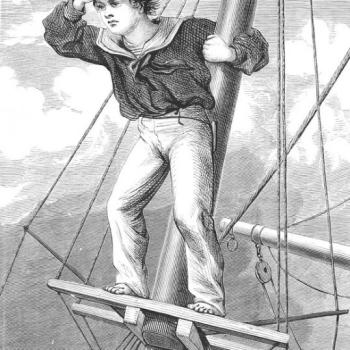Note: This article is part of a special Patheos Symposium, Passing on the Faith: Teaching the Next Generation. Read more perspectives here.
"What's the best curriculum for forming children and youth in Christian faith?" Here's the short version of my response: We invite people into the way of life that embodies God's love, justice, compassion, and reconciliation, by being, doing, and thinking about it together. The best curriculum for forming children, youth, and anyone else in Christian faith is guided participation in a community of practice where people are vibrantly, passionately risking themselves together in lives of faith in a world crying out for the love of Christ.
Guided participation in a community of practice puts a premium on both participation and practice. Watch children in play imitating the adults around them to see how even the youngest among us hunger to participate in the way of life they see enacted before them. That's a good instinct to follow, because people—children or otherwise!—don't become Christian by learning about what Christians do, say, or think (although at some point, particularly in adolescence and beyond, doing so can be an important part of deepening one's faith identity). We become Christian, taking on the identity of one who is a disciple of Jesus, by acting the way Christians act, and by talking the way Christians talk. Over time through practice, even our hearts and minds are formed in this way of life.
How does this work? Let me offer an example from another life arena, music. I'm a fiddle player in an Irish band. I did not start life as a musician. It is an identity that has been shaped and formed through participation in practice. Years ago as a child, guided by those who were already musicians, I clumsily held my instrument and drew the bow across the strings in hopes of making a sound worth hearing. I learned the language that musicians use to make sense of what they do by hanging out with musicians. Over time, I "became" a musician. My hands, formed over the years by daily practice at whatever level of ability I had at the time, took on the shape and action of musician's hands. My ears began to hear the music in the way that musicians hear, and I began to play as a fiddle player.
Making music, especially Irish music, now resides in my mind and heart. It has been a journey, one that I am still on. But over the years of guided participation in practice within a community of experienced musicians, I have taken on this identity. In a similar way, participation with a community in practices of neighbor-love, worship, and stewarding resources takes central place in Christian formation, shaping a person's hands and feet, heart and mind, to constitute a way recognizable as Christian. Children and youth need to be in a vibrant community where faith is practiced, and where they are invited into the practices, to take on the identity of being Christian.
As a "curriculum" of faith, guided participation in practice is not mere socialization through osmosis, as if just showing up were enough to form people in an identity. Showing up matters. But we already know that socialization alone leaves people doing lots of stuff without understanding why or what it means. Christian practices of celebrating the Lord's Supper make little sense to an outside observer unfamiliar with the story in which they are embedded, a story in which Jesus renders all ordinary eating holy by telling his disciples "whenever you do this, do it in remembrance of me." The story makes sense of the action; the action gives meaning to the story. Just as "showing up" alone is not enough, "thinking about faith" alone is insufficient for forming disciples.
Guided participation in practice isn't just doing. It includes sharing an essential skill, that of fully and actively practicing our faith in our everyday lives and making theological meaning out of the stuff of everyday life. Sickness, birth, aging, celebrating new jobs, gay marriage, deciding how to spend money, wondering how to make sure everyone has enough clean water, celebrating birthdays, suffering (ours and that of other people), how and what we eat, institutional racism, how we dispose of our trash, dealing with failed marriages and celebrating life-giving ones, job layoffs, and all the rest that is part and parcel of our everyday lives in the world—we Christians need to cultivate the skill of making sense of these experiences through the lenses of our faith stories that can in turn inform our actions. For that, we need places and ways to learn and inhabit faith stories.
When people ask me about the best curriculum for forming the faith of children and youth, they may not like what they hear back from me. I "get" why my response is so unsatisfying. I'm not making it easy on committee chairs who need to buy materials for next year's programs by endorsing a particular brand of curricular material. There's an important place for choosing good material. But the best classroom experience cannot take root if it is not embedded in a community life in which all kinds of people join together to practice being God's love, justice, compassion, and reconciliation.
8/13/2013 4:00:00 AM




